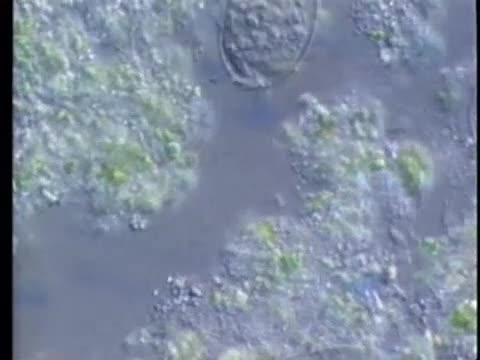WGBH Forum Network; An Imperfect Offering: Humanitarian Action for the Twenty-First Century; Harvard Book Store

- Transcript
Where do we get all the milk. Steak. Butter. And ice cream. We eat and drink. That's right. From House. Each year hundreds of millions of cows. Provide us with these foods. Approximately 60 million years ago a genetic mutation allowed some animals to digest leaves and grasses into useful nutrients. Over time. Animals with the mutation were so successful. That they spread and diverge into new species. Creating a class of animals called minutes.
Ruminants include our present day cows. Sheep. Goats. Camera. Unlike humans ruminants have more than one stomach which helps them digest all those tough leaves and grasses. After being chewed and swallowed the grasses arrive in the first stomach or room and bacteria in the stomach digest the mass of tough leaves and grasses. Next the bacteria passes to the cow's second stomach. Here using an enzyme found only in ruminants the cow digests the protein in nutrient rich bacteria.
These bacteria are the cow's primary source of food. In other words the bacteria digest the grasses and the cow digest the bacteria. This enzyme unique to ruminants is a genetic mutation of an enzyme found in all mammals called lysozyme. Humans and other mammals have bacteria fighting lysozyme in their saliva blood and tears. What standard lysozyme can survive in an acidic environment like the stomach ruminant lysozyme is different because it tolerates acid which means it fights or breaks up bacteria aiding the cow in its digestion.
So because of the small mutation millions of years ago. Ruminants evolved to digest the leaves and grasses that humans and most other mammals would digest very poorly. This mutation may have been small but its impact has been far reaching. And luminance have become the most dominant plant eating animals on Earth. And because of the meat and milk they provide. May be the most important animals in the world. To humans.
- Series
- WGBH Forum Network
- Title
- Harvard Book Store
- Contributing Organization
- WGBH (Boston, Massachusetts)
- AAPB ID
- cpb-aacip-15-j96057d39m
If you have more information about this item than what is given here, or if you have concerns about this record, we want to know! Contact us, indicating the AAPB ID (cpb-aacip-15-j96057d39m).
- Description
- Description
- Physician and humanitarian James Orbinski discusses his new book, An Imperfect Offering: Humanitarian Action for the Twenty-First Century.During his medical school days, James Orbinski journeyed to Rwanda on a year-long research trip. While there he saw unimaginable pain and suffering, suffering which his medical education had taught him was avoidable. The experience led him to found the Canadian chapter of Medecins sans Frontieres (Doctors Without Borders, or MSF). After many years of traveling and providing aid in Peru, Somalia, and Afghanistan, he answered a call to serve in Rwanda, during the worst of the brutality of the Rwandan genocide. Confronted by indescribable cruelty, he struggled to regain his footing as a doctor, a humanitarian, and a man. In the end he chose not to retreat from the world, but resumed his work with MSF, and was the organization's president when it was awarded the Nobel Peace Prize in 1999.An Imperfect Offering is a deeply personal, deeply political book. With unstinting candor, Orbinski explores the nature of humanitarian action in the 21st century, and asserts the fundamental imperative of seeing as human those whose political systems have most brutally failed. He insists that in responding to the suffering of others, we must never lose sight of the dignity of those being helped or deny them the right to act as agents in their own lives. He takes readers on a journey to some of the darkest places of our history but finds there unimaginable acts of courage and empathy. Here he is doctor as witness, recording voices that must be heard around the world; calling on others to meet their responsibility.
- Date
- 2009-10-21
- Topics
- Global Affairs
- Subjects
- Business & Economics; Culture & Identity
- Media type
- Moving Image
- Duration
- 00:04:01
- Credits
-
-
Distributor: WGBH
Speaker2: Orbinski, James
- AAPB Contributor Holdings
-
WGBH
Identifier: cpb-aacip-5cca329d3f2 (unknown)
Format: video/quicktime
Duration: 00:00:00
If you have a copy of this asset and would like us to add it to our catalog, please contact us.
- Citations
- Chicago: “WGBH Forum Network; An Imperfect Offering: Humanitarian Action for the Twenty-First Century; Harvard Book Store,” 2009-10-21, WGBH, American Archive of Public Broadcasting (GBH and the Library of Congress), Boston, MA and Washington, DC, accessed December 26, 2025, http://americanarchive.org/catalog/cpb-aacip-15-j96057d39m.
- MLA: “WGBH Forum Network; An Imperfect Offering: Humanitarian Action for the Twenty-First Century; Harvard Book Store.” 2009-10-21. WGBH, American Archive of Public Broadcasting (GBH and the Library of Congress), Boston, MA and Washington, DC. Web. December 26, 2025. <http://americanarchive.org/catalog/cpb-aacip-15-j96057d39m>.
- APA: WGBH Forum Network; An Imperfect Offering: Humanitarian Action for the Twenty-First Century; Harvard Book Store. Boston, MA: WGBH, American Archive of Public Broadcasting (GBH and the Library of Congress), Boston, MA and Washington, DC. Retrieved from http://americanarchive.org/catalog/cpb-aacip-15-j96057d39m